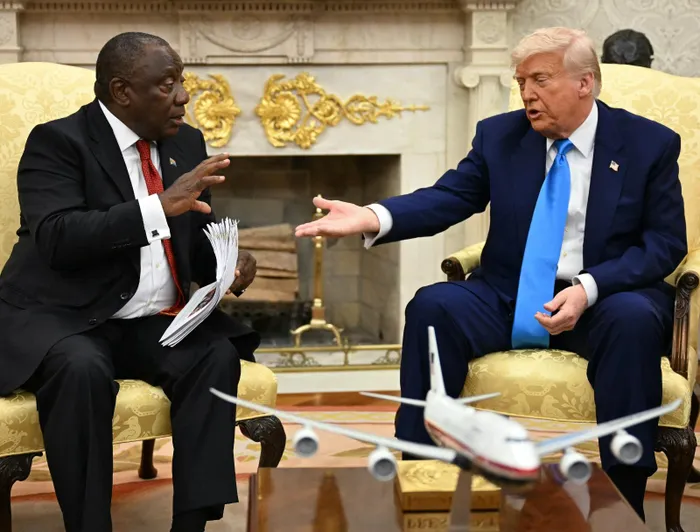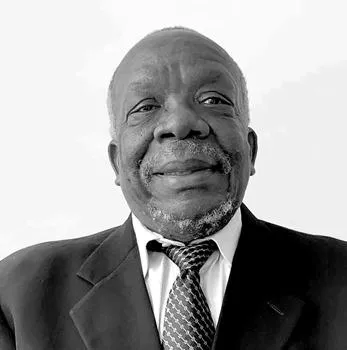Resetting US-South Africa relations: Insights from Ramaphosa's meeting with Trump
OPINION

US President Donald Trump hands papers with news clippings of alleged farm murders to President Cyril Ramaphosa during a meeting in the Oval Office of the White House in Washington on Wednesday.
Image: AFP
Despite the controversial debates doing the rounds on the President Cyril Ramaphosa and US President Donald Trump meeting at the Oval Office, Ramaphosa and team deftly manoeuvred themselves and notched some wins in a very difficult mission.
South Africa’s objective was a reset of the relations with the United States though the issue on the table was some “so-called genocide”. Obviously, the genocide accusation could be a red herring as there are underlying dynamics, which include Starlink, Russia and China, the BRICS fraternity and, without doubt, South Africa taking Israel, a key US ally, to the International Court of Justice.
Getting back to the meeting, many had feared a repeat of Trump’s treatment of Ukraine’s Volodymyr Zelenskyy. There was no humiliation. After all, Ramaphosa had tactically included in his team white South Africans whose word Trump could not question. One of them, Johan Rupert, painted the picture as it is; that of general lawlessness that is not aimed at any racial group and affects everybody. There is no genocide Rupert said, and John Steenhuisen endorsed this.
Trump had to believe Rupert, a pillar of the Afrikaner community, rather than some 49 inconsequentials. Trump is aware that Rupert, a respected South African, is deeply invested in the economy, contributes to transformation and supports local philanthropic ventures. He will not lie as he has a lot to lose. After the open session Trump and Ramaphosa had their closed meeting.
In a media session after the closed meeting, an upbeat Ramaphosa alluded that relations with the US are going back to normal. Minister Parks Tau confirms that South Africa submitted a framework on future US-SA trade relations which will be the base of the next round of discussions. The directive for the framework was agreed between Trump and Ramaphosa and is the basis of the next round of talks. This round could include addressing US Congress which is dealing with Agoa.
In addition, and in terms of the trade talks, Tau says we could soon be importing US liquid gas as our country is running out of supplies while, on the other hand, the US could be importing 40000 auto units duty free every year. Amendments to black econonic empowerment (BEE) regulations could see Starlink come to South Africa. According to reports, the amendments will require that the communications regulator, Icasa, harmonise BEE legislation with the Electronic Communications Act and the information and communication technology sector code.
Icasa will thus effectively allow an alternative to the 30% equity requirement, with as equity equivalents (EE) designed to allow all of the big international tech companies to operate in South Africa without selling a slice of their equity. This is not new as four major companies previously qualified in terms of EE.
If the above is contextualised on talks between Trump and the Canadian prime minister and meetings on trade between delegations from China and the US, Trump could be tactically reconfiguring his approach as against his previous aggression. Ramaphosa has scored big.
However, South Africa must urgently deal with three issues that compromise its relations with other countries or it is back to square one. The first is Afrikaner unhappiness; the second is the unemployment and poverty that are searing communities. The third, and needless to add, is the rampant crime and corruption.
Regarding Afrikaner sensitivities, we would not be here if some Afrikaners did not, rightly or wrongly, feel persecuted. Hence, there was a sinking feeling when Trump flighted the EFF rally in which Julius Malema led the “Kill the Boer” song. In addition are the recent visits and hostile references to Orania, Kleinfontein and other Afrikaner communities.
As these visits and the song impact on Afrikaner sensitivities, they also rattle the outside world as has happened and we must thus ask ourselves if it is worth it. For the record, the singers of the song and those who go on the visits are not committing any crime. One is worried about the impact.
After all, there is no genocide and the Afrikaners who went to Trump are a minority of the minority Afrikaner community. They also know they were lying when they spoke of genocide. Regardless, they got the attention which put us in the Trump challenge. We do not need this, also in terms of national cohesion and uniting the country under the flag.
Let us recall that in the original equality court judgment “the historical struggle background to the song” was acknowledged. But, there was an acceptance that “certain words in certain struggle songs may be experienced as hurtful by members of minority communities”. Hence, the judgment reads, “…the parties commit to deepening dialogue…to promote understanding of their respective cultural heritages and for the purpose of contributing to the development of a future common South African heritage”. There is thus no laissez faire, as with other songs, on the singing of “Kill the Boer”.
The same can be said of Orania and Kleinfontein as, in any case, what is wrong with people of a specific cultural identity keeping to themselves? If we stick to the principle of keeping to themselves; there are countless black communities who because of their culture keep to themselves. Yet, there are no visits to these but Afrikaners must be monitored.
In conclusion, and most importantly, we urgently need a Marshall Plan on job creation. We are in a poverty and jobs crisis. Foreign Direct Investment (FDI) and other global initiatives or relations must add to what we are doing rather than be our hope. If the gogga of joblessness is to be slayed, we need this multifaceted Marshall Plan with the President announcing monitored quarterly reports on unemployment levels.

Dr Thami Mazwai
Image: Social Media
Dr Thami Mazwai is a former political activist, journalist and editor.
BUSINESS REPORT
Related Topics: